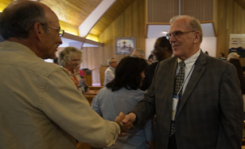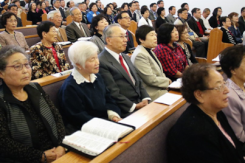Nearly 2,500 participants in the 222nd General Assembly (2016) of the Presbyterian Church (U.S.A.) spread out Sunday to worship in about 30 congregations stretching from Vancouver, Washington, to Salem, Oregon.
The connectionalism for which the PC(USA) is known was celebrated in several of them.
Ken Evers-Hood, the pastor of Tualatin Presbyterian Church, even devoted his children’s sermon to a mini-polity course – from session to presbytery to synod to General Assembly – and introduced a number of GA visitors from around the country and around the world.
“The great cloud of witnesses we talk about is visible here today,” he said of the more than 20 GA guests on hand. “We are part of something bigger.” Using the lectionary passage from Luke about the Gerasene demoniac, Evers-Hood drew parallels between the networks of the early church and the digital networks of today, suggesting that the reason Jesus did not permit the demon-free Gerasene to follow him to Galilee was to send him as a messenger of the Gospel to his connections in a Gentile land.
Noting that the strength of Rome was built on the famed network of roads throughout the Empire, Evers-Hood said the same network was used by early Christians to spread their message.
Jumping forward to last weekend’s tragedy in Orlando, he pointed to the key role digital social networks played in getting help to the victims of the mass shooting in the Pulse nightclub.
While modern life moves fast, and information and news travels faster than we can react, Evers-Hood said, these connectional networks also help keep people “believing that hope and peace and calm and light can make a difference.”
At Westminster Church in Portland, Laura M. Cheifetz used the same passage to urge her listeners to recognize and confront the demons in society and in our lives.
Cheifetz, vice president of church and public relations at Presbyterian Publishing Corp., who served as visiting pastor, was joined in the pulpit by Westminster pastors Beth and Gregg Neel and Laurie Lynn Newman.
“Where are our demons today?” Chiefetz asked.
She said guns, the criminalization of people suffering from addictions, child hunger, homelessness, unwarranted bombings by our military, gender bias, racism, and discrimination against immigrants and minorities as some of today’s demons.
“Is this a story about mental illness,” she asked. “A misunderstanding of how our brains work? I don’t know. Should I keep an eye out for our demons wherever I go? I don’t know. What I do know this: We must take these demons seriously.”
Chiefetz said it is vitally important that we respond collectively and individually to banish these demons in the spirit and with the compassion of Christ.
“We have all had our hearts broken,” she said. “We have seen suffering and have lived suffering … [and] been left cowering on the ground in grief and torment and terror. If we make it out, then we know what it is to go from naked to clothed, from possessed to in our right minds, from chaos and disorder to going out to share the good news of what has been done for us.”
Chiefetz said being a Christian is not “living in some fancy world of butterflies and unicorns,” but to “see a world full of demons.”
“We know these demons better than we would like to,” she said, “and we know what we are up against.” She said we must turn away from our fears and focus instead on the view of what God has done for us, because we are “called to “stare death, chaos and disorder in the face, and to proclaim the gift of life, God’s presence, and the power of healing in the same breath.”
“It is living the resurrection,” she concluded.
Meanwhile, the congregation of Covenant Presbyterian Church swelled when about 25 Assembly visitors piled off a bus and into the sanctuary. Covenant, located in the suburb of Gresham, just east of Portland, has approximately 68 members, including a small but growing contingent of Filipino members.
Despite its size, the tiny church is a powerhouse of mission activity. “You are a generous church,” said Rene Myers, a visiting member of the Presbyterian Mission Agency staff who was asked to give a Moment for Mission. “My role today is to say ‘Thank you.’”

Passing of the Peace at Covenant Presbyterian Church.
Covenant ranks second in per-member giving in Cascades Presbytery. The congregation recently raised $1,000 to buy filters for a clean-water project in Guatemala, and is collecting donations for the work of Presbyterian Disaster Assistance. Members are also active in SnowCap, a local agency established by Covenant and several other congregations to provide food, clothing, and other necessities to area residents in need.
Covenant’s pastor, Patricia Berger, and a number of church members are serving as volunteer greeters, communion servers, and prayer partners for the assembly.
Berger, a second-career pastor, was ordained at age 59. She has been at Covenant, her first church, for 10 years. She is ably assisted by Parish Associate Ann Richards, a retired minister ordained in 1979, when ordination of women was still a novelty to many in her presbytery.
In Berger’s sermon, she talked about Jesus’ healing of a man possessed by demons, as described in Luke 8:26–39. “God does the same for us,” she said. “We are more than our mistakes. We are more than our fears. We are more than the demons that bind us.”
In the wake of such horrific events as the shootings in Orlando, many of us “can be bound by our fears,” she said, “but we’ve not been created for fear; we’ve been created for life, for love.”
Before the service, on the bus en route to Gresham, volunteer Kathy Dunford, a member of Covenant for 25 years, asked whether any of the visitors would be willing to sing in the church’s choir. Five people volunteered. After a quick pre-service run-through of the anthem with Music Director Barbara Fredericksen, the choir filled the sanctuary with harmonious music.
After the service, members and guests shared a lavish lunch in the church’s fellowship room. Before climbing back onto the bus, each visitor was given a copy of Covenant’s cookbook, full of recipes tested in members’ kitchens and enjoyed at church pot-luck meals over the years.
Further north, at the Korean Presbyterian Church in Vancouver, Washington, assembly visitors piling off the bus from Portland were met by members of the church’s youth group, who gave Father’s Day cookies to the males in keeping with the congregation’s tradition of hospitality.
The first seven rows on one side of the simple but beautiful sanctuary were marked off for assembly-goers, who were given copies of the Korean-language worship bulletin and copies in English of the morning’s sermon. The service was conducted in Korean and simultaneously translated into English on a large projection screen.
Pastor Sun Mook Jhee was joined in the chancel by Sun Bai Kim, the Presbyterian Mission Agency’s associate for emerging Korean ministries, who will be retiring at the end of August after 28 years in the position. His sermon, based on Romans 1:14-17, focused on keeping, proclaiming and living the Christian faith in spite of the temptations and challenges of modern culture.
“Do not be shy or ashamed about your faith,” he said. “The gospel of Jesus Christ is the most precious and most powerful thing in this world.”

